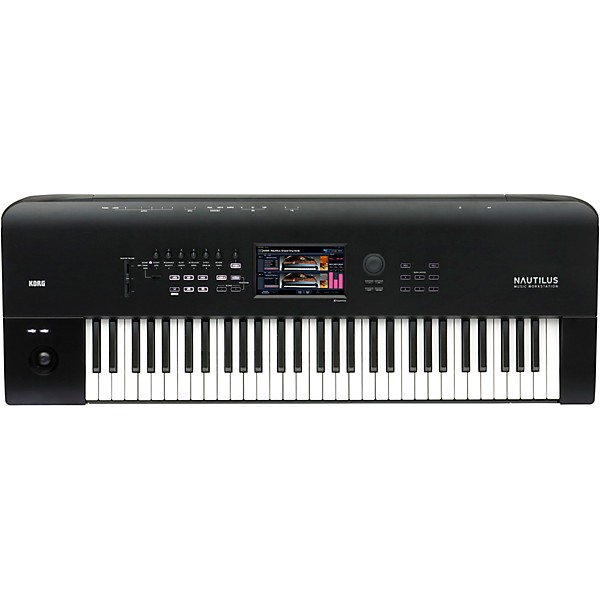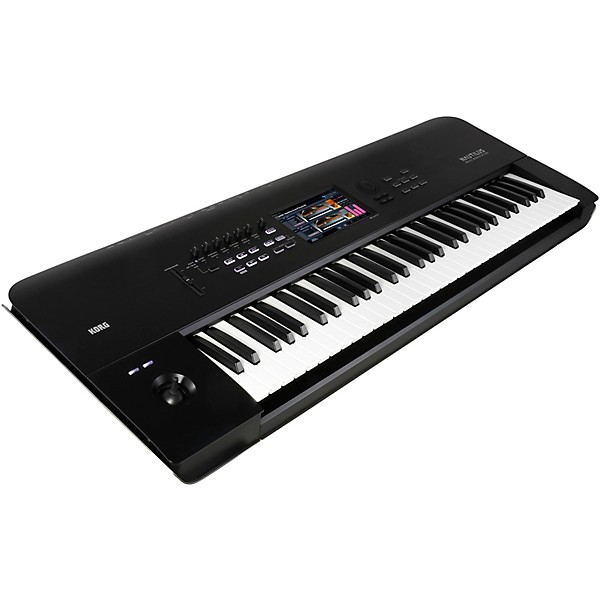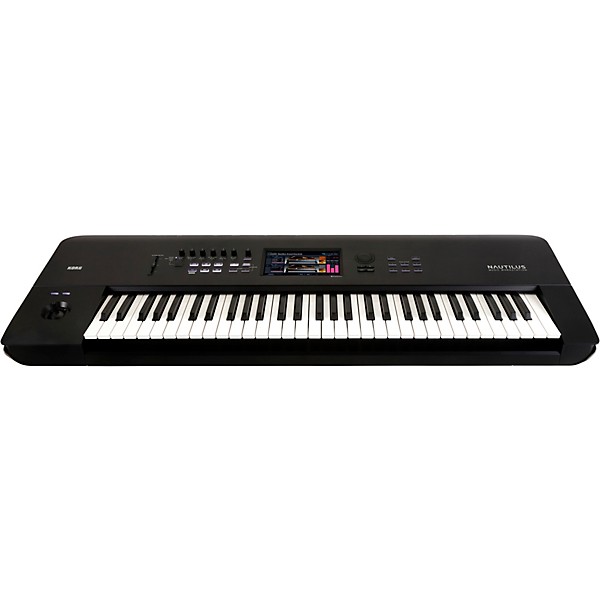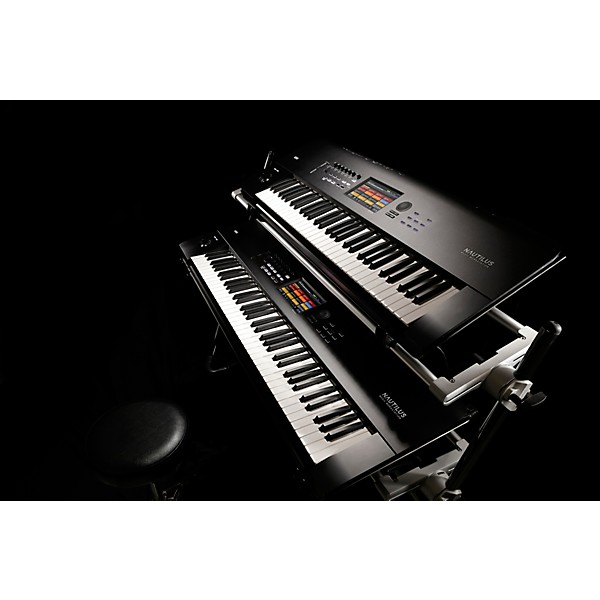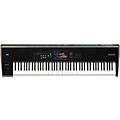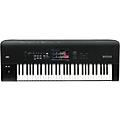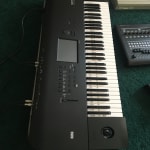- Popular Brands
40% Off Open Box Savings Available
KORG NAUTILUS Music Workstation - 61 Key
Videos (9)
View All
Korg NAUTILUS - All Playing, No Talking Sound Demo

The NAUTILUS: Video Manual Part 1- Introduction and Navigation

Korg NAUTILUS - Dazzling New Sounds; Streamlined Workflow; KRONOS Pedigree

The NAUTILUS: Video Manual Part 2 - Program Mode

Description
The Korg NAUTILUS Music Workstation is a premium synthesizer designed for musicians and producers looking to unlock vast creative potential. Boasting nine onboard sound engines derived from Korg's acclaimed KRONOS workstation, the NAUTILUS delivers over 2,200 preset sounds alongside extensive sampling and sequencing capabilities. is thrilled to introduce this innovative, cutting-edge instrument that places a world of sonic possibilities at your fingertips.
Unparalleled Sound Quality From Multiple Engines
At the heart of the NAUTILUS are nine dedicated sound engines that faithfully recreate the tones of essential instruments like pianos, electric pianos, organs, analog synths, and more. The enhanced SGX-2 piano engine captures every nuance of the acoustic piano, while the EP-1 mimics the iconic sounds of seven famous electric pianos. The CX-3 engine provides the distinctive tonewheel organ sounds that shaped generations of music. Combined with engines for analog modeling, physical modeling, and digital synthesis, the NAUTILUS offers a staggeringly diverse palette of sounds for any genre or style.
Massive Collection of Unique, Current, and Standard Sounds
The NAUTILUS features over 2,200 preset sounds divided into three categories: Unique sounds like prepared pianos and found percussion; Current sounds for modern music styles such as EDM, electro, and chiptune; and Standard sounds including pianos, guitars, basses, and more. The Unique and Current sound libraries contain one-of-a-kind samples created specifically for the NAUTILUS, offering inspiration for sound design and music production. The Standard sounds provide essential tones for any performance or recording situation.
Intuitive Interface and Real-Time Control
Despite its immense sonic depth, the NAUTILUS features an intuitive user interface that puts the sounds you need right at your fingertips. The touchscreen TouchView display offers elegant graphic interfaces for each sound engine and mode. Six real-time knobs provide hands-on control over filter cutoff, effect depth, arpeggiator tempo, and more. Four programmable knob templates let you customize the knobs for your preferred performance setups. The Dynamics knob enables you to adjust keyboard sensitivity on the fly for delicate acoustic-piano-like expression or a uniform synth-action feel.
Powerful Production Tools for the Modern Musician
As a true workstation, the NAUTILUS offers sophisticated yet accessible sequencing, sampling, and audio recording capabilities. The 16-track MIDI sequencer and 16-track audio recorder provide all the tools needed to compose and produce complete songs. An open sampling architecture lets you capture and manipulate your own samples using the NAUTILUS' onboard effects and synthesis engines. USB and MIDI connectivity allows for control from external keyboards, modules, and DAWs. For live performance, the NAUTILUS offers convenient features like seamless sound transitions, Set List mode for organizing programs and combinations, and an onboard drum track.
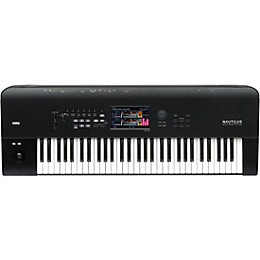
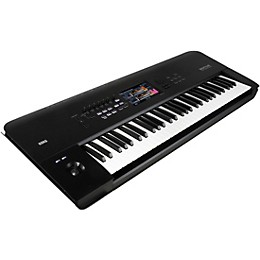
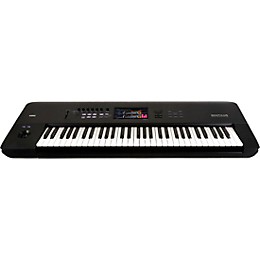
Features
- The flexibility and power of KRONOS' nine sound engines with expansions for the PCM and piano engines as well
- New, lightweight, rugged design with KORG's best RH3 action
- New "Essential" and "Future" sound sets join the KRONOS original and cover-focused sounds with 2,200 sounds in all
- Over $1,000 in EXS piano libraries include
- Nine sound engines from KRONOS, with updated SGX2 and HD1 engine for extensive new sound sets
- Streamlined Touchview interface and control panel with customizable mode buttons
- Full-featured sampling and HD audio recording
- KORG's Dynamic Polyphony Allocation and Smooth Sound Transition for uninterrupted playing and sound switching
- Up to 14 simultaneous effects and 32 simultaneous EQs for massive production power
Specs
- 61-key: Natural Touch Semi Weighted, C–C
- 88-key: RH3 (Real Weighted Hammer Action 3), A–C
- Velocity sensitive is supported, aftertouch is not supported
- Synthesis Types: 9
- SGX-2 Premium Piano (Acoustic Piano)
- EP-1 MDS Electric Piano (Electric Piano)
- HD-1 High Definition Synthesizer (PCM)
- AL-1 Analog Synthesizer (Analog Modeling)
- CX-3 Tonewheel Organ (Tonewheel Organ Modeling)
- STR-1 Plucked String (Physical Modeling)
- MOD-7 Waveshaping VPM Synthesizer (VPM Synthesis)
- MS-20EX Component Modeling Technology (Analog Modeling)
- PolysixEX Component Modeling Technology (CMT Analog Modeling)
- Maximum Polyphony *1 *2:
- SGX-2: 100 voices *3
- EP-1: 104 voices
- HD-1: 140 voices
- AL-1: 80 voices
- CX-3: 200 voices
- STR-1: 40 voices
- MOD-7: 52 voices
- MS-20EX: 40 voices
- PolysixEX: 180 voices
- *1: In rare cases, when a large number of processor-intensive effects are active simultaneously (for instance, more than 14 O-Verbs), polyphony may be slightly reduced. *2: A portion of the multicore processor in KRONOS is devoted to generating voices, and a separate portion is devoted to generating effects. KRONOS dynamically allocates the voice processing power between the engines as necessary. The quoted maximum numbers of voices apply when 100% of the voice processing power is devoted to a single engine. *3: 100 dual-stereo notes (equivalent to 400 mono voices)
- Preset PCM: 496MB/Disk 2.3GB (ROM 1,771 Multi samples, 3,955 Drum samples
- EXs301: German 2 D Piano
- EXs302: Italian F Piano
- EXs303: Japanese Upright U Piano
- EXs304: Prepared Piano
- EXs305: Historical Keyboards
- EXs306: Vintage Keyboards 2
- EXs307: Strings & Synths
- EXs308: Guitar Collection
- EXs309: Bass Collection
- EXs310: World Essence
- EXs311: Background Loops
- EXs312: SFX & Hits
- EXs313: Found Percussions
- EXs314: Expansion Drums
- PCM RAM Capacity: Approx. 2GB *4
- *4: The memory available for Sampling Mode will change based on the use of Expansion PCM libraries and User Sample Banks. Approx. 760MB is available when shipped from the factory (When loading the file named “PRELOAD.KSC”)
- Wave Sequences: 598 user memory, 377 preload, support for stereo multisamples, synchronization of individual notes and tempo-based settings
- Premium Piano
- Full-key stereo sampling, Chromatically sampled at up to 12 velocity levels, no looping
- Damper resonance and mechanical noise are reproduced
- Una Corda sample support
- EXs301 – German2 D Piano, 12 velocity levels, includes Ambience Piano type/samples
- EXs302 – Italian F Piano, 12 velocity levels, no Una Corda samples
- EXs303 – Japanese Upright U Piano, 8 velocity levels
- Exs304 – Prepared Piano, 1-4 velocity levels
- Piano Type: 128 (With the factory settings, the 64 varieties of EXs6: German D Piano, EXs7: Japanese C Piano, EXs12: SGX-1 Austrian D Piano, EXs17: Berlin D Piano do not produce sound. The options must be downloaded. (Those will be released at a later date.)
- Oscillator Control: Damper Resonance, Damper Noise, Mechanical Noise, Note Release, Modeled String Resonance, Una Corda
- MDS Electric Piano: Tine and reed-type electric pianos powered by Multi-Dimensional Synthesis (MDS), and vintage effects
- Electric Piano Model Types: Tine EP I Early, Tine EP I Late, Tine EP II, Tine EP V, Tine EP DMP, Reed EP200, Reed EP200A
- Oscillator Control: Harmonic Sound Level, Attack Noise, Level, Release Noise Level, Attack Brightness, Hammer Width
- Panel Control:Tine Type - Preamp Volume, Tone (Treble, Bass), Vibrate (On/Off, Intensity, Speed), Amp/Cabinet (On/Off, Drive) Reed Type - Preamp Volume, Tone (Treble, Bass), Vibrate (Intensity, Speed), Amp/Cabinet (On/Off, Drive)
- Effect Types: Small Phase, Orange Phase, Black Phase, Vintage Chorus, Black Chorus, EP Chorus, Vintage Flanger, Red Comp, VOX Wah
- Advanced Vector Synthesis: Control oscillator volumes and synthesis & effects parameters via the Vector Joystick and the tempo-synchronized Vector Envelope
- Structure: Single - only OSC1, Double: OSC1 and OSC2, Double mode lets you layer two completely separate synth voices, each with their own velocity-switched oscillator, dual filter, EGs, LFOs, etc., Drums - one drum kit, Double Drums: Two drum kits
- Oscillators: 8 velocity zones per oscillator, with switching, crossfades and layering, each zone can play mono or stereo Multisamples or Wave Sequences
- Filters: Two multi-mode filters per voices (low-pass, high-pass, band-pass and band-reject), Four-mode filter routings (single, serial, parallel and 24dB mode)
- EQ: Three bands with sweepable mid
- Driver: Per voice non-linear driver and low boost circuit
- Modulation: Three envelope generators, two LFOs per voice, common LFO, four key tracking generators, AMS (Alternate Modulation Source), two AMS mixers
- Quick Layer/Split function
- Advanced Vector Synthesis: Control oscillator volumes and synthesis & effects parameters via the Vector Joystick and the tempo-synchronized Vector Envelope
- Modulation: Common Step Sequencer, AMS (Alternate Modulation Source), Common LFO, 2 Key Tracking Generators
- EQ: Three bands with sweepable mid
- Oscillators: Ultralow-aliasing oscillators, OSC1, OSC2, Sub-oscillator and noise generator; ring modulation, FM and Sync
- Audio Input: External audio can be processed through the ring modulator, filter, driver, amp and EQ
- Filters: Two multi-mode filters (low-pass, high-pass, band-pass and band-reject) with four types of filter routings (single, serial, parallel and 24dB mode), Multi Filter mode (only Filter-A; modulatable mix of Low Pass, High Pass, Band Pass and dry input, for creating a wide variety of unique filter types and effects)
- Driver: Per-voice non-linear driver and low boost circuit
- Modulation: Five envelope generators, four per-voice LFOs, two AMS Mixers; Per-voice Step Sequencer
- Quick Layer/Split function
- Tonewheel Organ Modeling: Phase-synchronous tonewheels (clean and vintage modes), percussion, key click, wheel brake
- EX Mode: Four additional, user-specified drawbars and expanded percussion
- Internal Effects: Rotary speaker, vibrato/chorus, amp modeling with overdrive, 3-band EQ
- Drawbar Control: Controlled via nine front-panel sliders (via Tone Adjust)
- Split: Upper, Lower (even in EX mode)
- Modulation: Two AMS mixers
- Physically Modeled String: Includes physically modeled damping, decay, dispersion, nonlinearity, harmonics, dual pickups and more (most string parameters can be controlled in real time)
- String Excitation: Three independent excitation sources can be used simultaneously: Pluck, Noise and PCM; 16 preset “pluck” types, with modulatable width and randomization; Noise generator with saturation and dedicated low pass filter
- PCM Oscillator: KORG’s ultralow-aliasing technology, as introduced in the HD-1; 4 velocity zones per oscillator; Uses any mono Multisamples, including ROM, EXs, User Sample Bank or Sampling Mode; Supports Virtual Memory
- Excitation Filter: Dedicated 2-pole multimode filter for shaping the string excitation; filter can be enabled/disabled separately for each excitation source; Low Pass, High Pass, Band Pass and Band Reject modes
- Audio Input and Feedback: Run real-time audio through the string, including feedback through effects; modeled feedback includes modulate-able instrument-to-amp distance and orientation
- Filters: Dual multi-mode filters per voice; Single, Serial, Parallel (with split stereo output) and 24dB (4-pole) configurations; Low Pass, High Pass, Band Pass and Band Reject modes
- Multi Filter Mode (Filter A only): Modulatable mix of Low Pass, High Pass, Band Pass and dry input, for creating a wide variety of unique filter types and effects
- Modulation: 5 Envelopes, 4 per-voice LFOs, 2 Key Track generators, String Tracking generators, 4 AMS Mixers
- Waveshaping VPM Synthesizer: Combines Variable Phase Modulation (VPM), Waveshaping ring modulation, PCM sample playback, and subtractive synthesis; Able to convert-load SYX files
- 6 VPM/Waveshaper/Ring Modulation Oscillators: Phase and modulatable pitch per oscillator; 101 Waveshaper tables, plus modulatable Drive and Offset; use as oscillators, or as Waveshapers or Ring Modulators for other signals
- PCM Oscillator: KORG’s ultra-low-aliasing technology, as introduced in the HD-1. 4 velocity zones per oscillator; uses any mono Multisamples, including ROM, EXs, User Sample Bank or Sampling Mode; supports Virtual Memory
- Audio input: Run real-time audio through the VPM Oscillators and filters
- Filters: Dual multi-mode filters per voice; (Low Pass, High Pass, Band Pass, and Band Reject modes), two types of filter looping (Parallel and 24dB "4-Pole")
- Multi Filter mode (Filter A only): Modulatable mix of Low Pass, High Pass, Band Pass and dry input, for creating a wide variety of unique filter types and effects
- Patch Panel: Supports both preset algorithm (78 types) selection and free patching; three 2-in, 1-out mixers for scaling and merging audio, fully modulatable, with phase inversion; main 6-input stereo mixer, with modulatable pan and volume, plus phase inversion
- Modulation: 10 Envelopes, 4 per-voice LFOs, 9 Key Tracking generators, Per-voice Step Sequencer, 4 standard AMS Mixers, plus 4 simple AMS Mixers
- [MS-20EX Program]
- Oscillators: Ultralow-aliasing oscillators; VCO1, VCO2, Ring Mod, Pink and White Noise Generator
- Audio Input: Run real-time audio through the synthesis engine and ESP (External Signal Processor)
- Filters: 12dB/octave High Pass and Low Pass self-resonant filters
- ESP section: 24dB/octave Low Cut and High Cut filters, available per voice
- Patch Panel: Patchable audio and modulation, at audio rates
- Keyboard: Keyboard CV Out, Keyboard Trigger Out, VCO1+VCO2 CV In, VCO2 CV In
- VCO: VCO1+VCO2 External Frequency Control In, VCO1 Out, VCO2 Out
- VCF: External Signal In, External HP Filter Cutoff Frequency Control In, External LP Filter Cutoff Frequency Control In, HPF Out, LPF In, LPF Out
- VCO+VCF: Total External Modulation In
- VCA: External Initial Gain Control In, VCA In
- EG: EG1 Envelope Signal Normal Out, EG1 Envelope Signal Reverse Out, EG1+EG2 Trigger In, EG1 Trigger In, EG2 Envelope Signal Reverse Out
- MG: Triangle Out, Rectangle Out
- Noise Generator: Pink Noise Out, White Noise Out
- Sample and Hold:Clock Trigger In, Sample Signal In, S/H Out
- Modulation VCA: Control Voltage In, Signal In, Signal Out
- Manual Controller: Control Wheel Out, Momentary Switch
- ESP: Signal In, AMP Out, BPF In, BPF Out, F-V CV Out, Envelope Out, Trigger Out
- Others: EXi Audio In, Mixer 1 In, Mixer 1 Out, Mixer 2 In, Mixer 2 Out
- ESP (External Signal Processor): Use incoming audio as a trigger and/or CV source.
- Modulation: Original DAR (Delay, Attack, Release) and HADSR (Hold, Attack, Decay, Sustain, Release) EGs 1 &2,Original MG (with MIDI sync), Sample-and- Hold, MVCA, NAUTILUS: 4 additional multi-stage Envelopes, 4 additional per-voice LFOs, and 4 AMS Mixers
- Oscillators
- VCO: Saw, Pulse, PWM
- Sub Oscillator: Off, 1 octave below, 2 octaves below
- Filter: 24dB(4-Pole) Octave Low Pass self-resonant filter
- Effects: Integrated Polysix Chorus, Phaser and Ensemble
- Arpeggiator: Integrated MIDI-synced arpeggiator, with adjustable Range, Mode and Latch
- Modulation: Polysix - original ADSR EG and MG (with MIDI sync), NAUTILUS - two additional multi-stage Envelopes, two additional per-voice LFOs and four AMS Mixers
- Number of Timbres, Master Keyboard Functionality: 16 Maximum
- Keyboard and velocity splits, layers and crossfades of up to 16 Programs and/or external MIDI devices
- The tone adjust parameter function lets you modify program settings, and the master keyboard function lets you control external MIDI devices
- Advanced Vector Synthesis: Control oscillator volumes and synthesis & effects parameters via the Vector Joystick and the tempo-synchronized Vector Envelope
- Quick Layer/Split function
- System: Assignable stereo/mono samples with 8 velocity zones per oscillator (with crossfade functions)
- 2,560 user memory programs (1,920 [1,280 HD-1+640 EXi] come preloaded)
- 1,792 user memory combinations (256 come preloaded)
- 264 user memory drum kits (104 come preloaded)
- 256 GM Level2 preset programs + 9 GM Level 2 drum preset programs
- Number of Set Lists/Slots:
- 128 set lists, 128 slots per set list
- Each set list provides a 9-band graphic EQ, and a Tone Adjust function that allows program settings to be adjusted; Transpose setting; hold Time setting of Smooth Sound Transition (SST) supported for each slot
- System: Open Sampling System (resampling, In-Track sampling)
- Bit Depth/Sampling Frequency: RAM - 16-bit/48kHz stereo/mono sampling, DISK - 16- or 24-bit/48kHz
- Sampling Time: RAM - depends on the amount of available PCM RAM, DISK - maximum 80 min. stereo (879MB: 16-bit)
- Sample Locations: 16,000 samples/4,000 multisamples (128 indexes per multisample)
- Formats: KORG format, AKAI S1000/S3000 data (with advanced Program parameter conversion); SoundFont 2.0, AIFF and WAVE formats
- Editing: Time Stretch, Time Slice, Crossfade Loop and other standard editing features
- Insert Effects: 12, stereo in/stereo out
- Master Effects: 2 stereo in/stereo out
- Total Effects: 2 stereo in/stereo out
- Timbre EQ: One 3-band EQ for each timbre/track
- Effect Types: 197
- Modulation: Dynamic Modulation and Common LFO
- Effects Control Busses: Stereo side-chaining for compressors, gates, vocoders, etc.
- Effect Presets: Total 783 preset, Maximum 32 per 1 effect (Preset User)
- Arpeggiator Modules: One module in Program mode, two modules in Combination and Sequencer modes
- Arpeggio Pattern: 5 presets + ARP A 2,048 slots (1,593 come Preload) + ARP B 128 slots
- Controllers: On/Off, Latch, Gate, Velocity, Length, Swing, Tempo
- Drum Track Patterns
- 1,272 preset (common with the preset patterns of the MIDI sequencer)
- 1,000 user patterns
- Patterns created in Sequencer mode can be converted to drum track user patterns
- Trigger Mode/Sync/Zone/Swing, Drum SD, Tempo settings can be specified
- Tracks: 16-track MIDI sequencer + 16-track hard disk recorder + 1 master track
- Number of Songs: 200
- Resolution: 1/480
- Tempo: 40.00–300.00 (1/100 BPM resolution)
- Maximum Memory: 400,000 MIDI events or 300,000 audio events
- MIDI Tracks: 16 tracks plus the master track, 697 preset/100 user patterns (per song), 18 preset/16 user template songs
- Format: KORG (NAUTILUS, KRONOS, OASYS) format, SMF formats 0 and 1
- Audio Tracks: 16-track playback, 4-track simultaneous recording, WAV file format 16-bit/24-bit
- Maximum Single-file Recording Time (mono): 80 minutes
- Automation: Volume, Pan, EQ, and Send1/2; 10,000 regions (max.), Event Anchors, BPM Adjust
- RPPR (Realtime Pattern Play and Record): 1 Pattern set per song
- Auto Song Setup function
- Disk Mode: Load, save, utility, data filer function (save/load MIDI System Exclusive data), CD-R/RW (UDF format read/write), ISO9660 Level 1
- Controllers: Joystick, Switches 1 & 2
- Arpeggiator Control: On/Off, Latch, Gate, Velocity, Length, Swing, Tempo
- On/Off, Swing, Drum SD, Tempo
- Display: TouchView graphical user interface, 7" color TFT, WVGA (800 x 480 dots), adjustable brightness
- Frequency Response: 20Hz–22kHz, +/-1dB, 10 kohm load
- THD+N:20Hz–22kHz, 0.01%, 10 kohm load (typical)
- S/N: 95dB (typical)
- Dynamic Range: 95dB (typical)
- Crosstalk: 95dB, at 1kHz (typical)
- L/MONO, R, Individual 1-4:
- 1/4” TRS Balanced
- Output Impedance: 350 ohm Stereo; 175 ohm Mono (L/MONO Only),
- Nominal Level: +4dBu,
- Maximum Level: +16dBu (when load impedance is 600 ohm or greater)
- MAIN VOLUME slider controls only AUDIO OUTPUT (MAIN) L/MONO and R
- 1/4” stereo phone jack
- Output impedance: 33 ohm
- Maximum Level: 60+60 mW (when load impedance is 33 ohm),
- MAIN VOLUME knob (link with AUDIO OUTPUT (MAIN))
- USB-B: 24-bit, Sample Rate: 48kHz, 2 channels (digital output of the same signals as AUDIO OUTPUT (MAIN) L/MONO and R)
- Audio Inputs 1 and 2:
- 1/4” TRS Balanced
- Input Impedance: 10 kohm
- Nominal Level: LINE +4dBu
- Maximum Level: LINE +16dBu
- Nominal Level: MIC –22dBu
- Maximum Level: MIC -10dBu
- Source Impedance: 600 ohm
- USB-B: 24-bit, Sample Rate: 48kHz, 2 channels
- Control Inputs: Damper pedal (half damper supported), assignable switch, assignable pedal
- MIDI: In, Out, Thru
- USB: USB A (TYPE A) : For connection to external USB devices (QWERTY keyboards, MIDI controllers, ethernet adaptors, and storage), USB B (TYPE B) : MIDI/audio interface, MIDI: 1 (16 channel) input / 1 (16 channel) output, Audio: 2 channel input / 2 channel output *2 USB high-speed ports (supports 480Mbps)
- Disk Drives: 60GB SSD (2.5”)
- Power Supply: AC power supply terminal, Power switch
- Dimensions: (WxDxH):
- 88-key: 56.57” x 15.24” x 5.47”
- 73-key: 48.31” x 15.20” x 4.57”
- 61-key: 41.81” x 15.20” x 4.57”
- Weight: 88-key: 50.93 lb., 73-key: 32.19 lb., 61-key: 28.66 lb.
- Power Consumption: 40W
- Accessories: AC cord, Quick Start Guide
Warranty
All Korg products purchased from a Korg USA authorized dealer are warranted to be free from defects in material and workmanship to the original consumer purchaser as listed below:
Labor: 1 Year
Parts: 1 Year
Exceptions: Tubes, AC Adapters, Foot Switches: 90 days
Warranty Requirements and Limitations:
-Proof of Warranty - The customer must provide proof of purchase in order to obtain warranty service. The dated sales slip or copy thereof is the only acceptable proof of purchase.
-The product must be purchased from a Korg USA authorized dealer and have a valid serial number.
Damage resulting from the following causes are excluded from the warranty set forth above:
-Misuse, including damage occurring during shipment, damage caused by battery leakage, accident, fire, unauthorized repairs, tampering, cosmetic damage or other types of damage which are the result of improper handling or abuse.
-The cleaning of controls or contacts due to exposure to dirty, dusty, or otherwise contaminated environment.
-Damage resulting from modification.
-Damage to units used for loan or rental.
Register online and extend your warranty!
Register your new Korg keyboard, keyboard rack module or digital piano online and receive a certificate that extends the product warranty for an extra year from the date of purchase.
Reviews
4.67
6 Reviews
100%
of respondents would recommend this to a friend
- Accompaniment3
- Concerts3
- Electronic Music2
- Learning2
- MIDI2
- Heavy2
- Difficult to Use1
- Poor Instructions1
- 2 audio channel output via USB (same as Kronos2)1
- Experienced2
- Novice2
- Professional Musician1
- Responsive / Good Action5
- Good Audio4
- Touch Sensitive Keys4
- Easy to Use3
- Portable2
Reviewed by 6 customers
This is a fantastic keyboard!
Verified Buyer
submitted2 years ago
byMac
fromnorthern Ky
Submitted as part of a sweepstakes
Tons and tons of great sounds! I love the weighted action! I've always wanted to keyboard with weighted action, and this one feels fab! Highly recommended!
Nautilus is an updated Kronos2 with arp and w/o Karma
submitted4 years ago
byOSL
fromSoCal
I've owned this workstation for 46 days. So it is a keeper. Nautilus has everything I want in a modern 61 key workstation: Multiple synth engines. Realistic pianos. Great analog sounds. Tons of preset patches for string/woodwind/brass/percussion instruments and vocal/choir patches. Both, realistic and synthetic. Sounds that can be edited and created for custom programs and combos. Touchscreen controls, Modern sampling capabilities. 16 audio tracks. 16 midi track sequencer. Vocoder. 100s of onboard effect processors. 4 way joystick. Multiple individual 1/4" outputs. Removable storage capabilities. Large capacity internal storage capabilities. Assignable switch and pedal controls. Its pretty much a 2020 updated Kronos2 without aftertouch, Karma, a ribbon strip, physical vector joystick, digital input/output, 2nd SSD drive bay, gold plated inputs/outputs, and physical button controls for sequencer, etc. I chose it over a Kronos2 and never looked back. 2 minute boot time doesn't bother me. Only issue I have is it outputs only 2 audio channels through USB (same as Kronos2) instead of 16 audio channels. But you can output up to 4 separate audio channels through the individual 1/4" outputs, on a single pass. This Nautilus accompanies my previous legacy workstation in my studio.
A ++++
Verified Buyer
submitted4 years ago
byJames
fromFlorida
Learning
Love it nautilus 88
submitted4 years ago
byGabriel
fromhouston texas
Best keyboard I've played on but you may just have to tweak on the sounds a bit.
I would buy again, but I would prefer a video manual.
Verified Buyer
submitted4 years ago
byTyrone S
fromEmeryville
Songwriting. It has pro sounds but I'm having trouble with the midi operations.
WORTH WAITING FOR!!
submitted5 years ago
byHB
fromLos Angeles
Similar to Kronos.. super easy to use!!
- Previous
- 1
- Next
Q&A
Have a question about this product? Our expert Gear Advisers have the answers.
submitted4 years ago
asked byDon
fromWest Newyork, NJ
What accessories come with this unit? Hard case? Stand? Sustain Pedal? other?
Accessories: AC cord, Quick Start Guidesubmitted5 years ago
asked byPatrick
fromArvada, Colorado
How do you download sequences to a Mac? USB cable I imagine. Does this require additional software? I want to be able to transfer sequences to the Mac and email them. Thanks
Please give us a call to better help you out – 877-687-5403

.jpeg)
